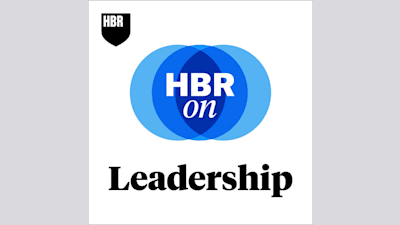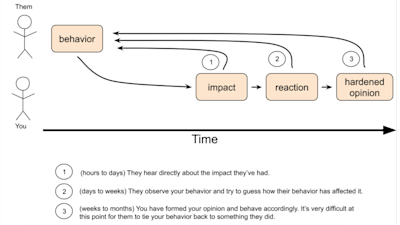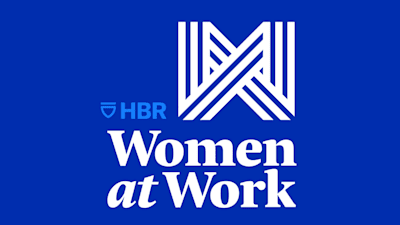
on
*sdílené články jsou řazeny od těch podle mě nejlepších po dobré

on

on open.spotify.com
We all know that leaders need to captivate audiences and effectively convey their ideas. But not every speaking opportunity can be prepared and practiced. That’s why it’s so important to learn the skill of speaking off-the-cuff, and Matt Abrahams, lecturer at the Stanford Graduate School of Business and host of the podcast Think Fast, Talk Smart, has advice to help. He explains how to stay calm in these situations, craft a compelling message, and ensure you’ve made a good impression. Abrahams is author of the book “Think Faster, Talk Smarter: How to Speak Successfully When You’re Put on the Spot,” as well as the HBR article “How to Shine When You’re Put on the Spot.”
on hbr.org
Every leader operates from a set of invisible assumptions that quietly shape their decisions and interactions. Some of these internal beliefs propel us forward—but others, what I call hidden blockers, undermine our best intentions without us even realizing it. When you’re in a leadership position, limiting beliefs don’t just stunt individual growth; they ripple outward to constrain your team members. One of the most dangerous for senior leaders is the hidden blocker “If I can do it, so can you.” If you think it is not a dangerous one read the article and see for yourself!

on hbr.org
When stepping into a new leadership role, giving feedback can feel risky—but delaying it can be just as costly. Thoughtful, well-timed feedback can build credibility, strengthen relationships, and set the foundation for a culture of trust and accountability. Four strategies can help leaders in a new role offer feedback with clarity and confidence: assess the organizational landscape, fast-track trust through vulnerability, align feedback with team members’ aspirations, and balance directness with empathy. Thoughtful, well-timed feedback can build credibility, strengthen relationships, and set the foundation for a culture of trust and accountability.

on hbr.org
This article offers strategies and scripts you can use to get more specific, tactical direction from your manager. The better you get at translating feedback from abstract to actionable, the more effectively you can deliver results.

on hbr.org
This is a conversation on handling uncomfortable situations. Many managers don’t know what to say when a team member appears angry, frustrated, or sad. They might even feel it is unprofessional to acknowledge those feelings at all. However, research shows that avoidance is costly. Teams perform better when their leaders respond effectively to members’ emotions.

on hbr.org
Managers have long been told that feedback is critical to organizational success. They attend training after training to learn how to give effective feedback in order to manage underperformers and ensure that employees are on the right track with their work. Managers also learn that feedback is a necessary ingredient for a company culture built on trust, accountability, and compassion. But what’s often missing from the conversation about the importance of feedback is the real reason why it matters: Feedback is a critical tool for helping employees find deeper meaning in their day-to-day work. This article covers three reasons why feedback can create more meaningful work, and how you as a manager can make sure your feedback conversations are designed for maximum meaning.

on read.highgrowthengineer.com
If you need a reminder on how to write documentation, prepare for a 1-on-1, or get ready for feedback, these templates will assist you.

on hbr.org
Who doesn’t appreciate the acknowledgment of their efforts and wins, or like to impress others occasionally? It’s equally important to cultivate internal validation: a deeper sense of self-worth that is free from the wavering opinions of others and the momentary dopamine hit of a gold star. Developing internal validation isn’t about cultivating baseless confidence or inflating your ego. Rather, it’s about counterbalancing common workplace features. In this article, the author shares four strategies to balance your perspective and stay self-assured despite external pressures and challenging work environments.

on brandminds.com
Knowing the difference between feedback and criticism is mandatory if you are looking to improve your leadership skills. This article gives you the basic distinctions and why they matter.

on hbr.org
Many managers only begin advocating for their employees when they’re afraid of losing them or when promotion cycles roll around. It’s a reactive approach, and it often comes too late. Advocacy is about continuously championing your team’s growth by recognizing their contributions, ensuring their efforts are relevant to the organization’s goals, and making their value visible to key stakeholders. Make advocacy an ongoing priority, and you’ll see the ripple effects.

on read.highgrowthengineer.com
Today, I’ll share common mistakes I’ve made and have seen, along with a template to make writing your review easier. Examples and template included

on newsletter.weskao.com
If you're not regularly giving feedback, you're missing a chance to scale your judgment. Here's how to give high-quality feedback in as little as 1–2 hours per week.

on hbr.org
Confronting direct reports about performance issues can feel overwhelming, especially for first-time managers, who may worry that sharing critical feedback could damage their relationship with the employee. But performance conversations, especially where you need to give critical feedback, don’t have to be scary. There are a few common mistakes to avoid when giving critical feedback. Being a great people manager is not about being a friend or being liked by everyone all the time — it’s about being a manager who cares about their employees and helps them get their job done.

on alexturek.com
I’ve given a lot of direct feedback. Sometimes, it’s been challenging to do, like when it’s critical feedback to a coworker I don’t know well. Other times, it’s been fun, like when I remember saying aloud, “Hey – nice work on that project.” These moments dominate my personal highlight reel from the last five years because they’ve been great experiences for both of us. Feedback is a gift. My goal is to get everyone reading this to give their peers more effective feedback.

on newsletter.eng-leadership.com
I regularly get questions about handling underperformance on LinkedIn and in sessions of my course, Senior Engineer to Lead: Grow and Thrive in the Role. Many first-time managers struggle with this issue, and the reason is that it’s not straightforward. It has many nuances, and it varies depending on the specific case.

on open.substack.com
Having a good manager is a blessing. Here's how to spot one! Your manager is one of the most important people for your growth in the organization. I’ve grown from engineer to CTO, and I’ll share my take on what makes a good manager from both sides → as an IC and a manager. Paid article

on open.spotify.com
When you’ve gone after something you want, like a promotion or less tedious work, did you follow the typical advice to lean hard into your confident, forceful side? When interacting with people at work, how often do you find yourself deflecting praise, downplaying your accomplishments, or responding “busy!” when someone asks how you’re doing? We frequently trade between being likeable and strong, but is it possible to be both assertive and warm?

on hbr.org
Listening is a vitally important skill, but it is sadly undertaught and physically and mentally taxing. This article offers nine tips to help leaders become more active listeners and breaks down the subskills involved in listening and how you can improve in them.

on hbr.org
It’s easy to get angry when you’re constantly picking up the slack or fixing mistakes caused by a rule-breaker. The unfairness of it all can also get under your skin and cause resentment. But you can’t just march up to them and demand they stop ignoring standards. Ordering them to fall in line rarely works. Here are five strategies for how to address the issue without creating hostility or damaging your working relationship.

on hbr.org
High performers are essential to a team’s success, often producing significantly more output than their peers. However, research shows that they often receive lower-quality feedback. Managers tend to focus on lower performers, neglecting the development needs of high performers. High performers tend to thrive on feedback and are motivated by it. To engage and retain high performers, managers should provide constructive feedback, highlighting areas of growth.

on newsletter.weskao.com
There’s a right and wrong way to proceed. Here’s how to increase the chances your leader listens and takes action–while reducing the chance they feel threatened.

on hbr.org
To manage the employee experience, leaders must deeply understand employees’ perceptions, feelings, and desires and respond thoughtfully. This is particularly crucial when immense resources are invested in gathering employee feedback through pulse surveys, town halls, and data scraping from internal communications. But leaders are often overwhelmed by the data and struggle to translate it into actionable insights. The authors conducted detailed interviews with executives and HR leaders from more than 20 multinational companies in sectors such as technology, financial services, and consumer goods. Their work reveals that although technology has simplified the collection of data, the real challenge lies in making sense of it and integrating it into a coherent strategy.

on hbr.org
Performance reviews are an important tool to help managers and organizations motivate and engage their workforce. Narrative-based feedback provides employees with more personalized analysis and can shed light on individual paths for improvement, while numerical feedback offers clear benchmarks for employees to track and meet specific targets. In a new study, researchers examined whether one format — or a combination of the two — was seen as more fair and motivating by employees. They found that while narrative feedback is perceived as the most fair, it can be especially meaningful for those employees with room to improve.

on peterszasz.com
Breaking down the feedback cycle process from preparation to follow-up. Approaches I found useful, antipatterns to avoid, and a document structure that can help bring it all to one place. I hope to turn this often-dreaded task into a powerful tool for individual growth and organizational success.
Přihlásit se k odběru nově přidaných inspirativních tipů pomocí RSS
Vedete technologický tým, máte na starosti marketing či HR v tech firmě a rádi byste se (nebo nejen sebe) rozvíjeli, ale nevíte, kde začít? Máte pocit, že se potřebujete ponořit do dalších témat a jen zajít na nejbližší akce či meet-up nemusí být dost?
Vyplněním e‑mailu se přihlašujete k obsahovému newsletteru tvůrce a souhlasíte s obchodními podmínkami.
